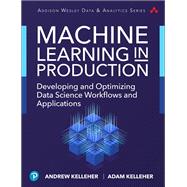The typical data science task in industry starts with an “ask” from the business. But few data scientists have been taught what to do with that ask. This book shows them how to assess it in the context of the business’s goals, reframe it to work optimally for both the data scientist and the employer, and then execute on it. Written by two of the experts who’ve achieved breakthrough optimizations at BuzzFeed, it’s packed with real-world examples that take you from start to finish: from ask to actionable insight.
Andrew Kelleher and Adam Kelleher walk you through well-formed, concrete principles for approaching common data science problems, giving you an easy-to-use checklist for effective execution. Using their principles and techniques, you’ll gain deeper understanding of your data, learn how to analyze noise and confounding variables so they don’t compromise your analysis, and save weeks of iterative improvement by planning your projects more effectively upfront.
Once you’ve mastered their principles, you’ll put them to work in two realistic, beginning-to-end site optimization tasks. These extended examples come complete with reusable code examples and recommended open-source solutions designed for easy adaptation to your everyday challenges. They will be especially valuable for anyone seeking their first data science job -- and everyone who’s found that job and wants to succeed in it.








